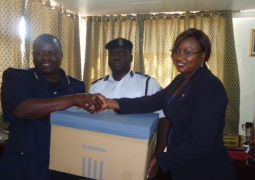Avirulent meningitis outbreak affects four countries of West Africa. To date, a total of 22,955 cases and 1,374 deaths have been reported. Nigeria is the most affected with 17,462 cases and 950 deaths; Niger reports 3,440 cases and 139 deaths, Burkina Faso reports 1,967 cases and 275 deaths, and Mali reports 86 cases and 10 deaths.
The epidemic strain A has been identified in Nigeria, Niger and Mali, whereas in Burkina Faso, it is the streptococcus pneumoniae.
In Nigeria, case management and a mass vaccination campaign are underway. The stock of vaccine may be insufficient regarding the epidemiological trends, especially in the districts in the north.
In Niger, case management and a mass vaccination campaign are underway. As of week 7, some 227,270 people have been reached in 5 districts. Vaccines are available in sufficient numbers.
In Burkina Faso, case management is underway. No available vaccine can adequately prevent the epidemic strain identified in Burkina Faso (streptococcus pneumoniae).
Active surveillance is overseen by national government, with the support of WHO. UNICEF procures vaccines and antibiotics for case management and prevention. On the ground NGOs like MSF and others play a key role in case management and mass vaccination campaign.
The disease causes inflammation of the lining of the brain and spinal cord. An airborne bacterial form, meningococcal meningitis is easily spread through droplets of respiratory or throat secretions, especially sneezing and coughing. The disease mainly affects children and young adults aged 1-30.
Symptoms include stiff neck, high fever, headaches, vomiting and sometimes seizures. Even when the disease is diagnosed early and adequate therapy instituted, 5% to 10% of patients die, typically within 24-48 hours of onset of symptoms, according to WHO. Most victims suffer irreversible neurological consequences.
Epidemic strains A, C and W135 are now the main serogroups observed in Africa.
The Sahelo-Sudanian band of Africa is an endemic area for meningococcal meningitis. The so-called “African meningitis belt” stretches from Mauritania in the west to Ethiopia in the east and is home to about 350 million people.
Outbreaks occur every year between December and May. The dry season, with strong dusty winds and cold nights make people more prone to respiratory infections and facilitates the spread of bacteria.
The largest recorded outbreak of epidemic meningitis was recorded in Africa in 1996, with over 250,000 cases and 25,000 deaths registered.
Preparedness for meningitis epidemics is difficult because vaccines cannot be administered until the different forms of the bacterium spreading are known. Surveillance and the establishment of stock of vaccines and antibiotics are essential to the preparedness efforts.
The current WHO recommendation for outbreak control is to mass vaccinate every district that is in an epidemic phase, as well as those contiguous districts that are in alert phase. It is estimated that a mass immunization campaign, promptly implemented, can avoid 70 per cent of cases.
Outbreak response also includes active surveillance and case management and support to community awareness programmes.
Once the disease is contracted, it can be treated in its early stages with antibiotics. WHO recommends oily chloramphenicol as the drug of choice in areas with limited health facilities.
A preventive vaccine is available against the serogroups A, C and W135. However quantities available worldwide are limited.
“It is health that is real wealth and not pieces of gold and silver.”
Mahatma Gandhi



